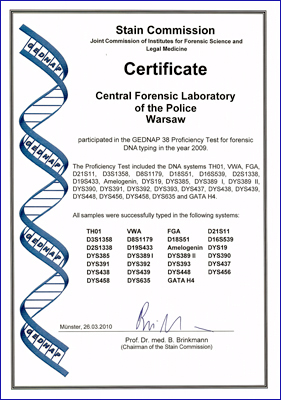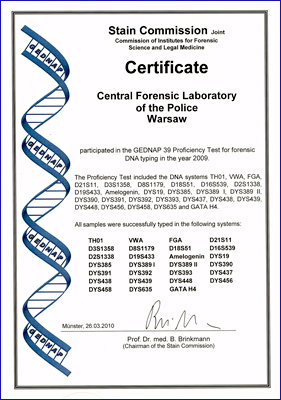Biology Unit
A core task of the Unit is to perform casework in scope of biological examination for the needs of law enforcement and justice system.
Biological examinations carried out in this Unit are of identification and comparison nature, meaning that the determination of origin of a biological stain or several stains from a person/common source takes place through profiling and comparison of identification features of human origin contained in examination material.
Most frequently examined stains include bloodstains and human body secretions, saliva, sperm and hair. Contact traces constitute another, quite abundant group of biological stains. Bone fragments, teeth or soft tissue fragments are less commonly submitted examination items.
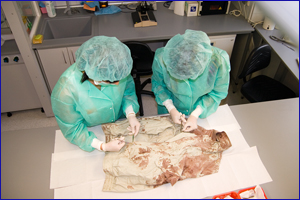
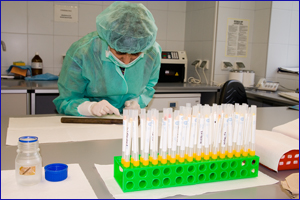
The most difficult task faced by experts and requiring advanced expertise, proficiency and experience is the analysis of evidential material. The majority of biological traces on examination items is invisible to unaided eye. Laborious work of experts to detect biological stains is supported by optical instrumentation and specialist tests.
Human identification of stains is carried out basing on polymorphic characteristics of human DNA extracted from biological traces. DNA analysis is performed with the application of the most recent molecular biology methods, multiplex STR systems and new generation genetic analysers. DNA profiling across ten loci of human genome provides for an extremely high likelihood that a biological stain originates from a particular person.
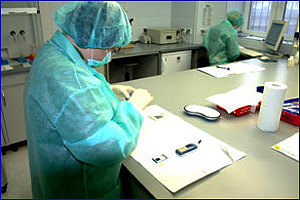
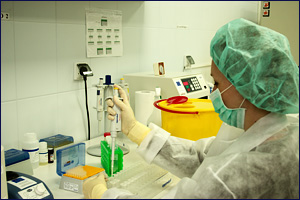
Other important areas of biology examiners’ work include the following:
- continuous raising of qualifications and improvement of skills by becoming familiarized with field-related literature, participation in lectures, scientific conferences, seminars and discussions;
- co-operation with national and foreign institutes dealing with forensic DNA;
- elaborating scientific publications;
- engagement in technical and forensic aspects of scene of crime investigation (high profile cases);
- providing consultations to the representatives of law enforcement and justice system as well as other legal bodies in a relevant scope; delivery of or participation in trainings;
- involvement in training process for candidate for experts in the area of forensic biology;
- participation in evaluation of work performance (forensic biology) in Voivodeship Police Forensic Laboratories/Warsaw Metropolitan Police Forensic Laboratory.
Co-operation with other laboratories and scientific institutes, verification of competency
Experts of the Unit co-operate with national and foreign scientific institutes and laboratories, which provide forensic examinations. Participation in ENFSI DNA Working Group provides an opportunity for exchanging experiences in DNA identification and taking part in standardization of analysis across Europe. A crucial aspect of co-operation includes yearly participation in interlaboratory proficiency tests organized by German Association of Forensic Medicine (GEDNAP), resulting in certificates which recognize the competence of CFLP experts in DNA analysis. Furthermore, experts take part in attestation of DNA laboratories organized by Forensic Genetics Commission of the Polish Association of Forensic Pathology and Criminology, being another proof of experts’ competence.
Within the framework of national co-operation with scientific institutes, CFLP biology experts are engaged in execution of purpose-fit projects co-funded by Scientific Research Committee. This project, led by Prof. Andrzej Plucienniczak of the Institute of Biotechnology and Antibiotics in Warsaw, resulted in elaboration of DNA database for Polish population in SGM+ system. The co-operation with the Institute resulted also in elaboration of new, patent-pending genetic markers applicable in forensic examinations.

